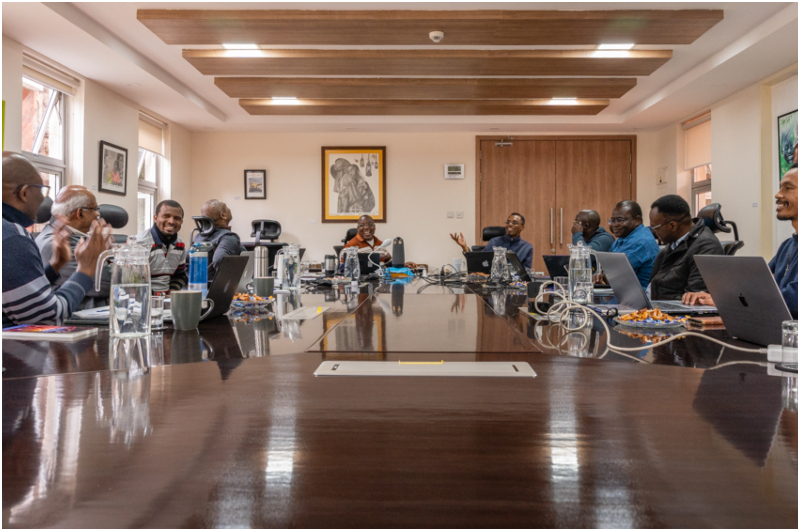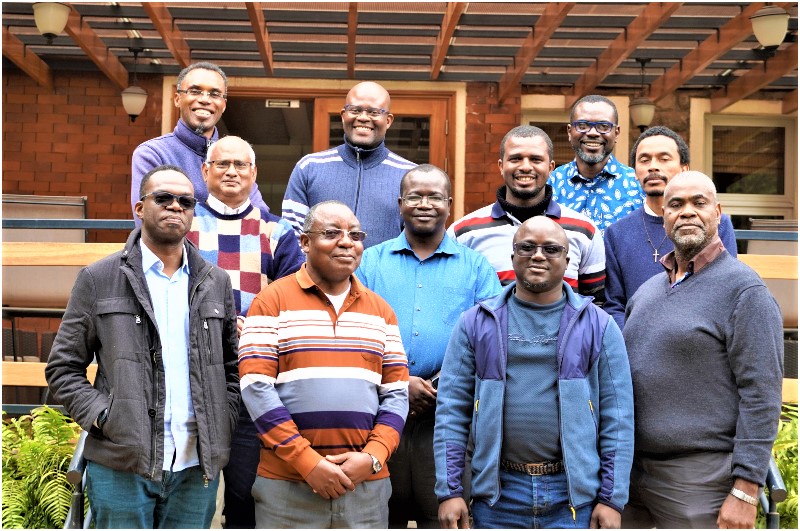

You can find Jesuits, true Jesuits, in every region, in every colour, in every activity. I think that is a sign of the Church for the world. What unites us all in our diversity is our connection with Jesus and the Gospel, and that is the source of the creativity of the Society and of the people with whom we share the mission.” - Arturo Sosa, SJ, Superior General
Father General’s quote is poignant to the African Jesuits in Science (AJIS) symposium that took place from 30th August to September 3rd, 2022. The symposium brought together scientific-minded Jesuits with contributions in the natural sciences (Physics, chemistry, biology) and formal sciences (Mathematics, computer science, data science, artificial intelligence, information technology, systems science, etc).
The symposium was the first of its kind in the Jesuit Conference of Africa and Madagascar (JCAM). The president of JCAM, Fr. Agbonkhianmeghe Orobator, SJ, described the symposium as historic, in his opening remark saying, “this gathering is historic not only because it recalls the past but because it actually opens a door to the future. So in a way we are beginning to write history at this very moment.” He also pointed out that though not all those who had been invited were able to attend, and not all those who fit the criteria for the forum were present, those who did, were a “representation of not only the past but, the present and the future”.
Well if we were to glimpse a little bit into the past between the 17th and 19th centuries we would unearth the place of Jesuits in science in history as one full of exploration, and discovery, yet marred with misconceptions and challenges like the Jesuit suppression which affected the Jesuits scientific work. A setback to the work that had been carried out by Jesuits for over two hundred years. Despite the impacts of the Jesuits' suppression in 1773 on Jesuits' scientific work in which they had been involved, the restoration by Pope Pius VII in 1814, however, marked a new beginning and science became and still is a Jesuit tradition, one that is propelled to date by the quest to “Find God in all things”. Science has since been birthed and perpetuated through Jesuit education with an emphasis on teaching and research in science. If we look at the same history, according to the JCAM president, the African continent has notable Jesuits in science whose work has been recognised locally and globally, most recently, the work of Fr. Jean Baptiste Kikwaya, SJ who as Fr. Orobator put it “as far as I know, he is the first and only Jesuit so far who has baptised an asteroid with his own name”.
The symposium as spelled out by the organising committee of AJIS was intended to enclave Jesuits from diverse disciplines with the common denominator being scientific observation and discovery. This, therefore, was an indication of the long-standing Jesuit scientific tradition, one of observation and discovery, an unveiling of the significance of science in the words of the JCAM president, Fr. Orobator, SJ, this was a “multi-disciplinary gathering”. He also said that the event propagated three important perspectives of the Jesuit’s way of proceeding, basically, discernment, networking, and collaboration “the fact that we are having this interdisciplinary moment is really a confirmation of how we work as Jesuits - we discern, and we work in common, we network with each other, and with others, we collaborate!”
In attendance were the following Jesuits presenting on various topics.
1. Michael Ochieng Otieno, SJ presented a paper on Dissecting the role of hnRNP K in the development and progression of solid tumors.
2. Jerome Manyahi, SJ, presenting a paper on Modal Interpretations of Quantum Mechanics Provides the Background for Understanding the Effects of Quantum Confinement in Nanosized Systems.
3. Herintsitohaina M. Ratsimbarison, SJ, presenting a social hydropower project in the context of Madagascar.
4. Williams Dhelonga, SJ, presenting a paper titled Sailing toward the stars: Mathematical modeling.
5. Jean-Baptist Kikwaya Eluo, SJ, presenting on Narrowing Down the Physical Characteristics of Optical Fast Rotating NEOs from Spectrophotometry.
6. Boniface Mbouzao, SJ, presenting on Early Predictions of Student performance in MOOC.
7. Itua Egbor, SJ, presenting on Interfacing the Spiritual and the Temporal: Rethinking Cybersecurity Posture for Our Time.
8. Martins Emeka Duru, SJ presenting a paper on Salivary Secretion and Composition in Malaria: A Case-control Study.
9. Lokadi Pierre Luhata, SJ, presenting on The Jesuit’s bark (Quina Quina) and the battle against “Mal-aria”: Importance of Ethnopharmacology in drug discovery.
10. Alain Pitti Djida, SJ, presenting on a 3D Molecular Design of Rep protein of African Cassava Mosaic Virus for Small Molecule Inhibitors Discovery.
11. Francis P. Xavier, SJ, from the Jesuit Conference of South Asia, presenting on the Impact of Artificial Intelligence on Life and Society With Reference to Africa.
There were several other presenters namely: Guy Consolmagno, SJ, the director of the Vatican Observatory, Kizito Kiyimba, SJ, the provincial of the Jesuit Eastern Africa Province, and Charles Chilufya, SJ, the director of the Jesuits Justice and Ecology Network in Africa (JENA).
The presentation by Br. Guy Consolmagno, SJ, on the history of Jesuits and Science, spoke volumes about the Jesuit’s long association with science. This a clear demonstration that when it comes to coexistence science and religion can indeed be in harmony. Though there have been many debates on science versus religion, with some not so encouraging, wiki-pedias list of Jesuit scientists dating back to the 17th century is a different tale. And even though these tensions don’t seem to have dissipated with time, seeing Jesuits from Africa part of writing their own history in the field of science in modern times and being involved in various research areas that provoke solving society’s problems, and embracing both science and religion as instruments that allow exploration of the universe and an understanding of our role in it, is indeed an encouragement.
Fr. Kizito Kiyimba, SJ indepthly highlighted the evolution of science at multiple levels. One of the significant points from his presentation was that “despite the controversies that science comes with even those that breed tensions within the various branches of science, the evolution of science should be an invitation to pay greater attention to the trends, to be more assiduous in the chosen areas of research. The complexities that emanate from this evolution should not be a point of departure, but, an examine of science should lead scientists to a response in time, to openness to the future as we might imagine or model it. Like we do the examen among Jesuits to catch ourselves in time, but also to be more available to God’s work”. His presentation explored science and culture; the world and science; and formation and collaboration in the area of science. Speaking of formation and collaboration he emphasised that “we need to teach collaboration towards solving clear problems…cultivate teamwork”. He hinted at a duty of collaboration across fields and within domains, saying, “I think that this is the justification of the formation of African Jesuits in Science (AJIS). So that we can see what we learn from one another, even within each of our separate domains."
Finally, a presentation on scientific research funding by Fr. Charles Chilufya, SJ, engaged participants on the various avenues that they can explore to enable them to continue their research. He encouraged participants to offer value propositions that could be centered around impacting communities. Fr. Chilufya also highlighted that there is an increased interest in and outside Africa in regard to advancing research and the recognition of the role of the knowledge economy. In his presentation, he indicated that despite the many challenges that Africa faces like the lack of high-level public investment and even private, due to minimal interest in research and development there are opportunities that can be explored. He spoke about one such opportunity as being the discernible link between poverty eradication and developments in science. He alluded that despite the challenges, AJIS as a group does present an opportunity for Africa in that they could support work in science that can be useful for poverty eradication and other social impacts. He spoke about the position that the Jesuit brand places AJIS in “I see that we carry a good opportunity to the Jesuit brand. You know we are known to do things like these, so even where people would doubt the support of the Jesuit brand, the possible Jesuit and non-Jesuit collaboration should become evident because we’ve been in this field for a long time and there is a lot of opportunities for us to collaborate with others."
We are grateful to the African Jesuits in Science for their contributions and commitment to the production of knowledge. May they take the JCAM President’s challenge to turn their gaze to the joys and hopes, the griefs and anxieties of the people of this age especially those who are poor and afflicted in light of the Universal Apostolic Preferences.
Related Articles
Select Payment Method
Pay by bank transfer
If you wish to make a donation by direct bank transfer please contact Fr Paul Hamill SJ treasurer@jesuits.africa. Fr Paul will get in touch with you about the best method of transfer for you and share account details with you. Donations can be one-off gifts or of any frequency; for example, you might wish to become a regular monthly donor of small amounts; that sort of reliable income can allow for very welcome forward planning in the development of the Society’s works in Africa and Madagascar.
Often it is easier to send a donation to an office within your own country and Fr Paul can advise on how that might be done. In some countries this kind of giving can also be recognised for tax relief and the necessary receipts will be issued.


